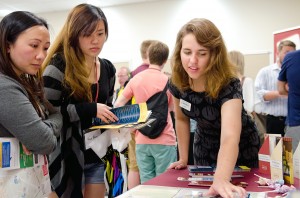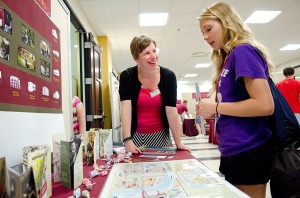By Suzy Frisch
Working at freshman orientation in Coffman Union, Kate Peterson sought to engage incoming students in conversation about what the University of Minnesota Libraries can offer. She emphasized that they can use all 13 libraries while connecting them with collections that match their intended majors.
Peterson, the undergraduate services librarian, turned one student’s T-shirt into an ice-breaker.
“Is that Captain America?” she asked Dani Hartle. “Did you know that we have a comic book collection of first-edition works at the Andersen Library?” Hartle, who is leaning toward a design major, wasn’t aware of its Children’s Literature Research Collections but the comics certainly piqued her interest.
Peterson aimed to open new students’ eyes to varied studying options and the diversity of the University’s collections. She often mentioned that the Diehl Bio-Medical Library is open until 3 a.m. and round-the-clock during finals season. It’s an important message, because engaging students with the library is key to their success. Peterson points to University of Minnesota research findings that freshmen who use the library in their first semester earn better grades and are more likely to return for second semester than those who don’t.
Peer Research Consultants provide 1-to-1 support

Alexa Wright, a senior English major and peer research consultant, with students and parents at Freshment Orientation 2014
At orientation, new students also learned about Peer Research Consultants, who help others become excellent researchers by guiding them through the process. The consultants assist students one-on-one with developing research questions, finding source materials, narrowing topics, or using web sites and databases—skills integral for writing strong research papers.
Alexa Wright, a senior English major and Peer Research Consultant, chatted up future clients at orientation. Working with consultants, she says, helps students improve their research skills and opens doors to the Libraries’ materials and resources.
“Writing a research paper takes time and effort, and it can be daunting, especially for students who don’t write a lot of papers,” says Wright. “As a peer, I’m also doing research, so I’m in the same boat as them. It’s nice to get help rather than have to go it alone.”
There are four consultants available, and they offer walk-in hours and appointments.
“We have a growing number of first-generation and international students who might not be familiar with an American library,” Peterson says. “Sometimes it’s intimidating to come to a librarian. We thought a tutor model might be successful.”
24/7 support includes chat, subject librarians
But it’s not the only resource available to new students. In addition to topic-focused libraries, like Walter Library and its science and engineering collection, there are dozens of subject-matter librarians throughout the University.
Other library training happens during students’ first-year writing course, where they get experience doing hands-on, original research. For 24/7 support, the library offers live chat, thanks to a worldwide consortium of librarians. During regular hours, University librarians answer questions. But at 3 a.m., when students are panicked about finding that essential source, an Irish or Australian librarian might guide them.
But first, orientation continues during Welcome Week, when students attend Academic Survival events on conquering their first paper or video presentation. There, librarians will showcase some of the U’s unique collections, including a large selection of cookbooks, by making dorm grilled cheese sandwiches with irons. Peterson adds, “We want students to know that they can come and use the books, but we have other amazing resources, too.”





